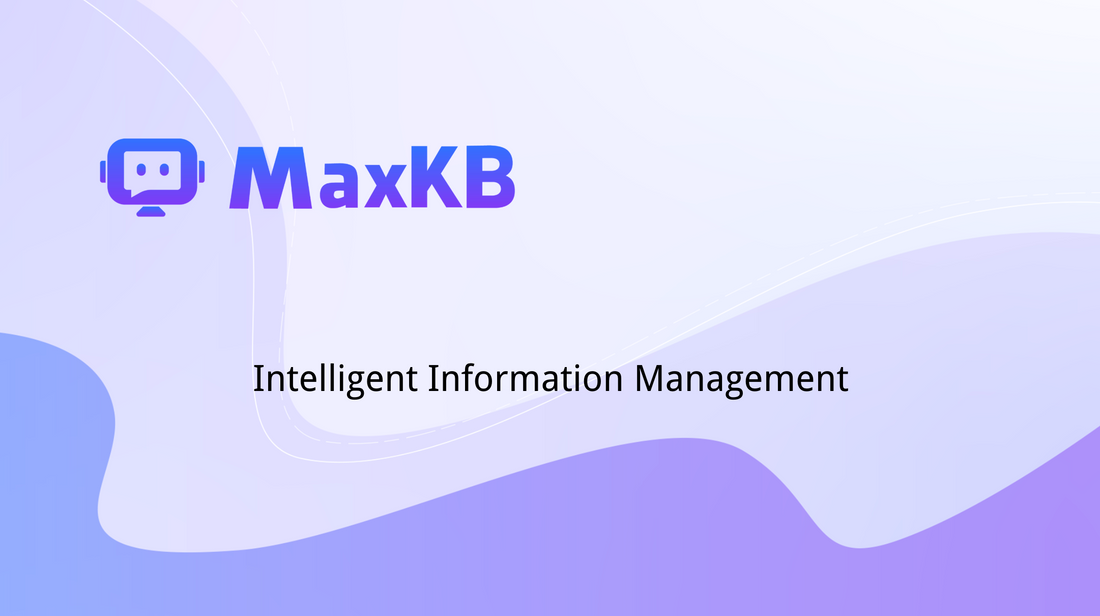
Knowledge Bases Explained: Why MaxKB Represents the Future of Intelligent Information Management
Share
What is a Knowledge Base
A knowledge base is a system or platform that centrally stores, organizes, and retrieves information. Through structured documents, metadata, and search functions, it presents scattered knowledge in a findable and reusable form for users. It can host product descriptions, operation guides, as well as record team experiences and technical documentation, helping users quickly obtain needed answers.
Internal Knowledge Base vs. External Knowledge Base
- Internal Knowledge Base: Primarily faces internal employees within an organization, containing company processes, R&D documentation, internal training materials, and common problem solutions. It typically has strict access control and permission management, only available for team members or specific roles to read and edit.
- External Knowledge Base: Open to external users or customers outside the company, such as help centers, FAQs, and customer cases. It focuses on answering user questions, reducing support costs, and enhancing customer satisfaction and brand image through good documentation experiences.
Benefits of Knowledge Bases
- Improved Efficiency: Users can quickly obtain answers through self-retrieval without repeated inquiries, saving support and communication costs.
- Reduced Costs: Decrease the burden on human customer service, lowering training and operational expenses.
- Knowledge Preservation: Transform implicit experiences into explicit documents, ensuring the continuity and consistency of team knowledge.
- Optimized Decision-making: Management can discover user pain points and documentation gaps by analyzing knowledge base usage, guiding product and business improvements.
- Enhanced Collaboration: Multi-role collaborative editing and review, promoting cross-departmental knowledge sharing and cooperation.
What Constitutes a Good Knowledge Base
- Comprehensive and In-depth Content: Covers various usage scenarios and provides multi-level guidance from basic to advanced.
- Clear and Readable Organization: Reasonable directory structure, breadcrumb navigation, and tag classification, allowing users to find needed information with just a few clicks.
- Concise and Accurate Expression: Uses clear titles, short paragraphs, and example operations, avoiding jargon pile-up and ambiguity.
- Personalized Recommendations: Dynamically pushes relevant documents based on user roles, browsing history, or feedback, improving hit rates and satisfaction.
- Multimedia Assistance: Rich in illustrations, supporting flowcharts, screenshots, videos, and interactive demonstrations, making complex steps visually intuitive.
- Regular Maintenance and Updates: Timely revises or adds documents based on product iterations and user feedback, ensuring content aligns with actual functions.
- Collaborative Management: Opens comment and feedback mechanisms, involves multiple roles in review, ensuring document quality and reliability.
Why MaxKB is a Good Knowledge Base Product
MaxKB (Max Knowledge Base) is a powerful and easy-to-use knowledge base chatbot product built on Large Language Models (LLM) and Retrieval-Augmented Generation (RAG) technology. It outperforms traditional knowledge base solutions in several ways:
- Ready-to-Use Convenience: Supports direct document uploads or automatic crawling of online documents, automatically completing text segmentation, vectorization, and RAG processes, reducing hallucinations in large models and providing more accurate intelligent Q&A interaction experiences.
- Flexible Orchestration Capability: Equipped with a powerful workflow engine and function library, capable of meeting AI process orchestration needs in complex business scenarios, making the knowledge base not just a query tool but an intelligent assistant that can solve complex problems.
- Seamless Third-party System Integration: Supports zero-code rapid integration into third-party business systems, quickly adding intelligent Q&A capabilities to existing systems, enhancing user satisfaction.
- Model Neutrality: Supports various large models, can use both private models (such as DeepSeek, Llama, Qwen, etc.) and public models (such as OpenAI, Claude, Gemini, etc.), meeting security and performance requirements in different scenarios.
- Rich Model Provider Support: Compatible with many mainstream AI model providers both domestic and international, including Alibaba Cloud Bailian, Azure OpenAI, DeepSeek, Gemini, Ollama, Tencent Hunyuan, Qianfan, Tongyi Qianwen, Volcengine, iFlytek Spark, and more.
MaxKB Application Scenarios
MaxKB is suitable for multiple scenarios, with powerful features making it an ideal choice for many industries:
- Enterprise Knowledge Management: Transforms internal company documents, processes, and experiences into structured knowledge, facilitating employee queries and learning, improving overall work efficiency.
- Intelligent Customer Service: Provides customers with 24/7 uninterrupted intelligent Q&A service, quickly answering common questions, reducing human customer service workload, and improving customer satisfaction.
- Education and Training: Integrates textbooks, course materials, and learning guides into the knowledge base, providing intelligent learning assistance tools for students and teachers.
- Technical Support: Establishes comprehensive documentation centers for technical products, helping users and developers quickly solve technical issues, reducing repetitive work for support teams.
- Research and Analysis: Supports academic researchers in intelligent analysis and extraction of large volumes of literature, accelerating knowledge discovery and innovation processes.
How to Start Using MaxKB
Starting to use MaxKB is very simple, just follow these four basic steps:
- Add Models: Select and configure AI models suitable for your needs, supporting multiple choices including OpenAI, Gemini, and mainstream domestic large models.
- Create Knowledge Base: Upload documents or set up web crawling, the system will automatically complete document processing and vectorization, building an efficient knowledge retrieval system.
- Create Applications: Create applications based on models and knowledge bases, which can be simple Q&A applications or complex workflow applications.
- Publish Applications: Obtain embedding code, seamlessly integrate into your website or system, providing users with intelligent Q&A services.
MaxKB's system architecture is reasonably designed, adopting a modern technology stack including Vue.js frontend, Python/Django backend, PostgreSQL/pgvector vector database, and supporting various large language models, ensuring system stability, scalability, and high performance.
Conclusion
In an era of knowledge explosion, a good knowledge base is not just a collection of information, but a precipitation and inheritance of wisdom. MaxKB, by combining advanced AI technology with humanized design, provides organizations and individuals with a powerful knowledge management tool, helping users quickly find needed answers in massive information, improving work efficiency and decision-making quality.
Whether for internal enterprise knowledge management, customer support, or education and training, MaxKB can provide you with a one-stop solution, making knowledge more valuable and intelligence more accessible.
